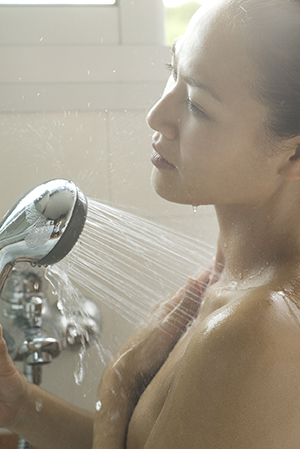Breast Care After Birth
A few days after your baby’s birth, your breasts may swell with milk. They are likely to feel sore and heavy. This is normal. To help prevent breast soreness and control irritation, follow these tips.
 |
| Moist heat, like a shower, helps to promote the release of breastmilk. |
Coping with swelling
Here are tips to cope with breast swelling:
-
Use cold compresses or an ice pack to help reduce the ache or pain.
-
Breastfeed often to keep milk from clogging your breast ducts.
-
If your nipples are flat from breast swelling, express some milk by hand. Squeeze out a few drops of milk by massaging and compressing your breasts.
-
If you have swelling with pain or fever, call your healthcare provider.
Preventing sore nipples
Here are tips to prevent sore nipples:
-
Make sure your baby latches on to your breast correctly. The baby’s mouth should be opened very wide and much or all of your areola should be in the baby's mouth
-
You can let milk dry on your nipples. This dried milk can protect the skin on your nipple.
-
Don't use alcohol, soap, or scented cleansers on your breasts. These can cause the nipples to dry and crack.
-
Don't wear nursing pads that are lined with plastic. They hold in moisture and can cause chapping.
-
If you have cracked or bleeding nipples, consult your healthcare provider or a lactation consultant. They will make sure that your baby's latch is correct and may suggest topical treatment, like pure lanolin.
Choosing a good bra
Wearing the right-sized bra is especially important now. If a bra is too tight, it may cause a duct in your breast to clog and become irritated. If possible, have a bra salesperson help fit you for a new bra. Look for one that’s 100% cotton and comfortable. Also choose a bra with wide straps that won’t dig into your back and shoulders. If you’re breastfeeding, find a nursing bra that allows you to uncover one breast at a time.
If you are not breastfeeding
Here are tips to prevent discomfort:
When to call your healthcare provider
Call your healthcare provider right away if you have any of these:
-
A fever or chills
-
Extreme tiredness and body aches, as if you have the flu
-
Burning feeling or pain in one or both breasts
-
Red streaks on a breast
-
Hard or lumpy spots in one or both breasts
-
A feeling of warmth or heat in one or both breasts
-
Breasts so swollen your baby can't latch onto the nipples
-
Nipples that are cracked or bleeding
-
Low milk supply or your milk does not flow freely
© 2000-2024 The StayWell Company, LLC. All rights reserved. This information is not intended as a substitute for professional medical care. Always follow your healthcare professional's instructions.